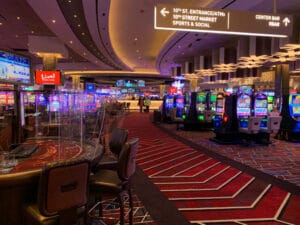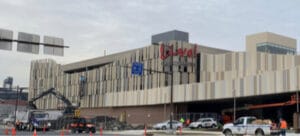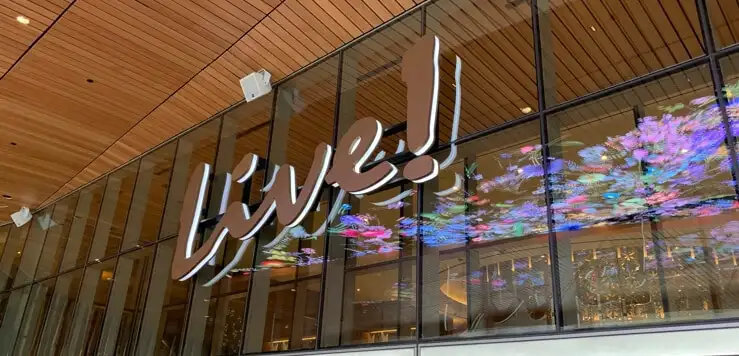Gamblers visiting four southeastern Pennsylvania casinos already leave behind well more than a billion dollars a year ordinarily at slots, blackjack, and other games, and the big question starting Tuesday afternoon is how they’ll take to a fifth option — especially now in the COVID era.
The Live! Casino & Hotel Philadelphia opens at 4 p.m. as the first shiny, full-sized casino added to Pennsylvania’s gaming industry since the debut of its nearest competitor, Rivers Philadelphia, a decade ago.
The 2,100-slot machine property in the city’s Stadium District will operate for its first few weeks on a controlled reservation or invitation-only basis, but after 8 p.m. on Feb. 11, the doors will be open to anyone at any time.
That is when The Cordish Companies, the Baltimore-based private firm that lavished $700 million on the project, will begin finding out if the investment was worth it. It is also when competitors in a market that already provides ample gambling opportunities will start to learn how Live! impacts them.
As of now, before the first Live! customer has dropped a $5 chip on red or black at the roulette table — other than those doing so at charity nights over the weekend — there’s cause for for optimism, say those from the new and existing casinos and an industry analyst.
‘I wouldn’t view it as a saturated market’
Within 25 miles of Live! in the Philadelphia metropolitan area, the newcomer has competitors in the Rivers Casino, which is just six miles to the north and also inside the city, plus Parx in Bucks County, Harrah’s in Chester County, and Valley Forge Casino Resort in Montgomery County.
In the 2018-19 fiscal year, the last “normal” one in which the casinos were unaffected by COVID shutdowns and restrictions, those four combined to take in $892 million in slots revenue and $415.4 million from table games.
They collectively represented about 40% of the state’s brick-and-mortar gaming revenue, which was from 12 casinos at the time. With the addition of Live! this week, there will be 14 in the state, as its satellite casino in Westmoreland County opened in November as the 13th.
So is there really room for this one more, with a bevy of restaurants, a 208-room hotel, and a big events center as part of a 510,000-square-foot property? No question, says Joe Billhimer, executive vice president of Cordish Gaming Group.
“I view it as a very mature market with a lot of visitation still going to other states from this market. I wouldn’t view it as a saturated market, like the Mississippi Gulf Coast or other places with numerous properties,” he said. “I would stress our location and the facility we’ve put together as the biggest driver [of visits].”
In referring to “other states,” the most prominent would be New Jersey. Just an hour or so drive from Live! are nine Atlantic City casinos that collectively took in $1.5 billion in land-based gambling revenue in 2020.
“One of our first objectives is to try to keep Pennsylvania business in Pennsylvania,” Billhimer said, no doubt echoing the wishes of commonwealth officials who rely more heavily on tax revenue from gaming than is the case anywhere else in the U.S.

Analyst foresees ‘substantial’ gaming growth
Live! is counting several factors in its favor entering the market: proximity to stadiums and arenas where four major professional sports teams play; a first-class hotel of the kind that only Valley Forge has among its nearest competitors; easy access from Interstates 95 and 76; and the high number of travelers for business and tourism that normally come to the nation’s eighth biggest metro area, which itself has more than 6 million residents to draw upon.
Brian Wyman, senior vice president of operations and data analytics for The Innovation Group, a gaming consulting firm that has done extensive work in Pennsylvania, agrees those are justifiable reasons to think Live! can succeed. And importantly, it can do so while growing the market instead of simply cannibalizing from Pennsylvania competitors, he said.
“There will definitely be net growth across the properties in the Philadelphia market,” Wyman said. “Obviously, if you put a competitor just down the road from any of these properties, there will be some cannibalization — all of these I think are expecting some impact — but in the aggregate there will be substantial growth.”
He said some gamblers who have been driving to Atlantic City will find Live! more convenient than their other Pennsylvania options have been and reallocate their spending. Others who are big-time sports fans (Live! also includes a FanDuel Sportsbook) but haven’t been to casinos much will find the chance for such a visit staring them in the face before and after games.
And individuals who have been going to other casinos for years will want to try out the newcomer, which is part of a brand that emphasizes dining and entertainment options in addition to what takes place on the casino floor.
“There are lots and lots of reasons why people go to one casino vs. another, or go to a casino at all, and having a diverse set of amenities is a good thing for consumers,” Wyman said. “Live! has a brand that’s growing. … When the property opens, I think there will be a lot of folks visiting just to see what it’s about.”
Rivers Casino calls the competition ‘welcome’
While it stands to reason there are at least 13 casinos in two states within easy traveling distance of Live! that curiously await its impact, none has more cause for concern than Rivers.
That Rush Street Gaming-owned casino in the Fishtown neighborhood, formerly known as SugarHouse Casino, has had the city to itself since opening in 2010. Prior to COVID’s reduction in revenue, it was making more than $300 million annually off of players’ slots and table game losses. It filed an unsuccessful lawsuit years ago to try to block Live!, which itself was then known as Stadium Casino, and avoid having that any of that income siphoned.
Eric Fitzgerald, general manager of Rivers since October, conveyed a different attitude about the new competitor in an interview last week.
“We welcome them here to Philadelphia,” he said. “Their company, Cordish, provides a great product, but we provide an equally great product. As long as we both do a great job in delivering to our guests, we know that — hopefully — it will keep players not leaving the Philadelphia region to go to other casinos. We think the market can grow, that it’s not oversaturated.”
Fitzgerald said there are bound to be casino patrons from Pennsylvania for whom Rivers is an inconvenient location, based on where they live, and they might relish the Live! arrival for that reason. But the overall volume of local population and visitation leaves plenty for both Philadelphia casinos, he said, and Rivers plans no special response to do anything differently just because of the newcomer.
While Cordish officials view the Stadium District location as a great asset on post-COVID-era game days when the 76ers, Flyers, Phillies, and Eagles play, Fitzgerald said the crowds and traffic around Live! on those days could also work to Rivers’ benefit.
“With all the sports fans we have in Philadelphia, there’s probably an equal number of sports fans that may want to avoid that,” Fitzgerald said. “On game days, it’s going to be hard getting in and out of there. … [Live!] can’t change their location, I can’t change our location, so we’re going to take advantage of what the location gives us.”

COVID raises an additional question about debut
There have been few casino openings across America since the COVID pandemic hit in March, so there is little from which to gauge how difficult it makes things for a new gambling facility to attract customers. The most notable debut has been the large Circa Resort & Casino property in downtown Las Vegas, but no revenue figures are available as a measure of its performance.
On a smaller scale, Cordish’s Live! Pittsburgh mini-casino at Westmoreland Mall was open just a few weeks in November-December before being impacted like the rest of the casino industry by a state-mandated shutdown that only ended Jan. 4. In the time it has been open, Billhimer said, “our expectations were met or exceeded.”
Now the larger Live! Philadelphia starts out with handicaps unforeseen in original projections, in that no sports fans are coming into the Stadium District, few tourists are visiting Philadelphia and filling hotel rooms, and there are COVID-related limits to the entertainment/dining options that the new operator would like to tout.
In general, due to state COVID restrictions and health concerns among the public, slots and table games revenue has been off about 20% in Pennsylvania in recent months compared to a year ago. Southeastern Pennsylvania casinos have performed somewhat better, generally down about 15%.
“Certainly, we didn’t plan to open during the pandemic, nor did anyone expect to be in the position we’re in now,” Billhimer said. “We’ll drive as much revenue as we can in a safe environment. We’re not a publicly traded company that has to throw out big numbers. … We’re here for the long term, at the beginning of a very long road for the business — we just want to do it right.”
Wyman said it helps Live! in the COVID era that it can rely on local business, as the destination markets like Las Vegas have suffered far more from people’s normal entertainment and travel behavior being disrupted.
“We’ve seen a much less dramatic impact on a lot of regional properties than we might have thought initially,” Wyman said. “If you had asked operators at the start of the pandemic if they would take 80% of their existing revenue, I think they all would have jumped at 80%.”
And in the case of a brand new property opening, it would be pushing it to say COVID is a good thing, but its impact isn’t necessarily all negative.
“If the question is whether this is the worst possible time to be opening, I don’t think that’s the case,” Wyman said. “There will be some organic revenue loss from people staying home and people not traveling, but I also think having an opening that has a little lower volume enables you to work out some of the operational kinks that come with openings.
“If it was going to be a problem for them, I think they would have pushed it back. I think they’ll do well out of the gate.”
The first indications will come this week, based on the number of patrons who make reservations at LivePhillyRSVP.com for the “preview days” that run through Feb. 11.






